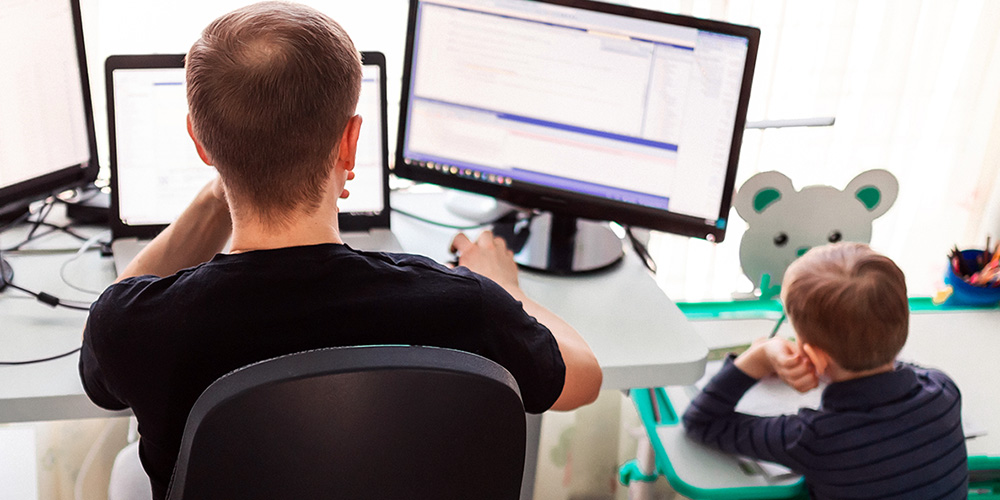
How to stay focused when you're WFH
Are you struggling to remain focused when working from home? Read our simple guide to find out what you can do to overcome challenges and remain focused when WFH.
16 May 2022
Over the last few years, lots of us are now working from home (WFH) more regularly. For some it’s been a welcome change to the hustle and bustle of a busy office environment, but for others it’s been a challenge.
Whether you’re working from home full or part time, there are things you can do to help you be more productive and stay focused. In this blog, we’ll share some ideas you might find useful – they might even come in handy for when you’re at the office too.
Working from home challenges
There are both benefits and challenges to WFH, the distractions that come from a home environment are usually very different to those in the office, here’s a quick look at some of the pros and cons of WFH:
Benefits:
- No commute: when you WFH, the commute is the distance from your bed to your desk, meaning you can sleep in longer, or finally be able to fit in that work out before you start work if you want to. It can also save you money in fuel costs, parking, or public transport fares
- More flexibility: WFH usually means you have more flexibility with your day, enabling you to do things like pick the kids up from school or have an extended lunch break to catch up with old friends - as long as you’re getting the work done and your boss is happy with this arrangement of course
- Less distractions: not true for all, but working from home is likely to be quieter than an office and all the distractions that come with it
- Work/life balance: if you’re able to switch off at ‘home-time’ you’re home as soon as you’ve finished work, meaning you get to spend more time with the people you love.
Challenges:
- Isolation: a lack of collaboration and support from co-workers can result in feelings of isolation, leaving you with a lack of motivation
- Boredom: WFH can be an incredibly lonely place to be, and can get really boring too. It’s important to make sure you schedule in time to speak to other people if you need to socialise with others
- Interruptions: door to door sales people, delivery drivers and the kids getting home from school can all distract you from your work
- Technical issues: when you work from home, you’ll need to make sure your Wi-Fi works well enough for you to be able to log on to your work systems securely and reliably.

How to stay focused working from home
If you find it hard to remain focused when working from home, you’re not alone. There are different distractions that can tempt you away from the desk – jobs that you wouldn’t be tempted by if you were in the office – like emptying the dishwasher, hanging the washing on the line, or checking your social media activity.
It can be tricky to maintain a good work/life balance when WFH, but there are some changes you can make to suit you and your home office to help you stay focused, take a look at our list and see what changes might work for you:
1. Setup your home office
Establishing a specific home office work environment can help you get into ‘work mode’ and focus on the tasks at hand. Whether you’ve got a private home office or a corner of the kitchen table, by setting it up as a ‘work only’ zone, you could improve your focus levels, here are some of the things you might like to try to get your home office ready for work:
- Desk: if you’ve got the space for it a desk can help you get into the right mood for work
- Office chair: it’s important to be comfortable at work, make sure your office chair is at the correct height and tilt for you
- Lighting: make sure you have a light that enables you to see what you’re doing
- Monitor: your monitor is one of the most important pieces of equipment when working from home. Invest in the best quality one you can afford. Between 24 and 30 inches should work well. Depending on your job and the desk space you have, multiple screens can be really helpful
- Computer accessories: you might find it more comfortable to use an ergonomic mouse and keyboard
- Stationery: it’s helpful to have your own supplies when you’re working from home, keep a store of things like paper, pens and paperclips
- Internet: it’s tricky to WFH, attend virtual meetings and send emails if your internet isn’t great, before you start to work from home you might need to check the bandwidth is adequate from your internet provider.
2. Structure your day
For some, discipline, planning and organisation comes really easy, but for others, it can be really challenging to keep on track with the things they need to do. Working from home can offer more flexibility, but it’s helpful to set up a structure that works for you, and your boss.
Get into the habit of prioritising your workload and reviewing it to see what you need to get done each day. Everyone works differently, so if you’re more productive in the mornings, make sure that’s the time of day you book for your most important jobs.
If you’re not going to be working the same hours as everyone else in your team, let them know when they can get hold of you. You could add your working hours to your email signature, or ensure you unavailability is booked out of your diary.
It’s also a good idea to let the people you live with know when you can and can’t be interrupted.
3. Manage interruptions
The interruptions you face in the office are different to the ones you might get at home, and the chances are, the interruptions you get at home will need to be dealt with by you. Things like answering the door or answering questions from the kids. There are other distractions too like social media notifications that might put you off doing your work too, so it’s worth switching those off.
It can be helpful to have separate work and personal phones if you can. It’s very tempting to respond to a message, then have a quick browse on your personal phone, so remove the temptation. Make sure anyone who might need to get hold of you in an emergency has your work number, and put your personal device away.

4. Positive distractions
Not all interruptions are bad, positive distractions can help get you out of a funk and back on track. Here are some examples:
- Power nap: not the easiest thing to do if you’re not a home worker, but if you’ve got to that point in the day where you’re struggling to keep your eyes open – you’re not going to be doing your best work. If you have the ability to do so, taking a power nap of approx. 20 minutes can really boost your mood and energy levels
- Exercise: getting some exercise done in the middle of the day, or when you’re starting to switch off can really improve your ability to get the job done. Exercise increases your circulation and in turn endorphins which gives you an instant energy boost
- Wellbeing breaks: it’s really important to step away from the desk. Some of us need a bit of a push to do that so make sure you schedule in some breaks – and call them well-being breaks (that's what they are after all!) Set it as a recurring event in your diary so it becomes a habit and avoid double booking it with anything else
- Tidy work space: feeling a bit disorganised? Take a look around you. Is your desk a bit cluttered or are your emails a disaster zone? Why not take 15 minutes or so to have a quick tidy up of your work space? Once you’ve done that, open the window (if you can) to get the air moving and go and grab a drink or a snack. When you come back you’ll hopefully see the difference and feel re-invigorated to get on with your work
- Doodling: being creative can help you focus on your job. Taking a few minutes to be artistic gets your brain thinking a bit differently. This creativity will often inspire you to reconsider and rethink the task you’re doing, making it more interesting and therefore help you to complete it more effectively.
5. Use ‘to do’ lists
The first step to getting organised is knowing what needs to be done, and a to-do list is a good place to start. There are a few different ways to do this. You may have a notebook to jot down those ideas, but there are also lots of apps and other tools available now to really take your list-making to the next level. It can be really invigorating when you start to cross things off your list when they’re done too.
6. Set achievable goals
When you’re creating your to-do list, and scheduling in the tasks you need to complete, consider whether you’re being realistic. You know how you work and what you can get done in a day. Think about how you’re going to split your day up. If you don’t get everything done when you wanted to, make sure you understand why, and how you can make changes to your schedule if you need to.
It’s a good idea to have regular reflection time in your diary to give you a chance to think about things that went well, and what didn’t to help you in the future. Once you get used to setting realistic and achievable goals, it’ll help you with continued motivation, productivity and ongoing focus.
7. Dress for success
For some, dressing in office clothes when working from home can help them get into the right mind-set for a day at work. It can also help you to look and feel more professional when speaking to people via video call too. Make sure you speak to your boss to check if there are any uniform requirements when working from home.
Hopefully this blog has given you some ideas to try next time you’re working from home and need to focus. If you enjoyed reading it, we’ve written a whole module to help you understand some more about productivity and how to stay focused at work, including some of the digital tools you can use to help you.

